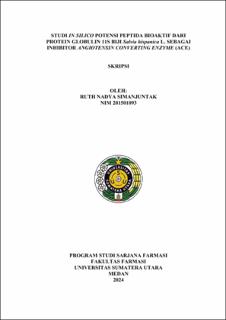Studi In Silico Potensi Peptida Bioaktif dari Protein Globulin 11S BijI Salvia hispanica L. sebagai Inhibitor Angiotensin Converting Enzyme (ACE)
In Silico Study of Bioactive Peptides from 11s Globulin Protein of Salvia hispanica L. Seeds as Angiotensin Converting Enzyme (ACE) Inhibitor

Date
2024Author
Simanjuntak, Ruth Nadya
Advisor(s)
Permata, Yade Metri
Metadata
Show full item recordAbstract
Background: Hypertension is a degenerative disease with a high mortality rate.
Angiotensin Converting Enzyme (ACE) receptors play a role in blood pressure
regulation through the Renin Angiotensin Aldosterone System. The 11S globulin
protein peptide from Salvia hispanica L. seeds is predicted to have activity as
antihypertensive agent through ACE inhibition.
Objective: This research aims to predict that the activity of 11S globulin protein of
Salvia hispanica L. seeds as an antihypertensive by inhibiting ACE in silico.
Methods: This research was used biological activity prediction by PASS Online,
physiochemical Lipinski Rule of Five by ScfBio, pharmacokinetics by
SwissADME, allergenicity by AllerTop, and toxicity by ToxinPred as well as
molecular docking of ACE.
Result: Based on the research, 146 peptides are predicted to antihypertenaive
activity by PASS Online, 31 peptides qualify the Lipinski's Rule of Five, 21
peptides qualify the ADME parameters, 83 peptides are not allergenic, and one
peptide GCCSAQM is toxic. From the docking results, the binding affinity value
between the peptides and ACE inhibitors ranged from -5.004 to -10.058; the
binding affinity of native ligand was -10.400; the binding affinity of captopril was
-5.368. From amino acid residue analysis, it is known that all peptides have similar
amino acid residues with native ligand and captopril. FYTNAPRL has the smallest
binding affinity value -10.058, which was obtained through hydrolysis using the
enzyme pepsin.
Conclusion: The 11S globulin protein peptides of Salvia hispanica L. seeds have
antihypertensive activity, with test results showing that each peptide has inhibitory
activity on the ACE in silico.
Collections
- Undergraduate Theses [1719]
